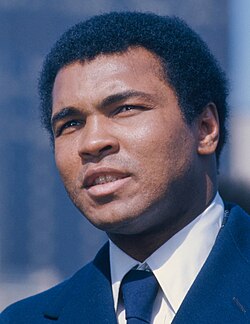
Boxing and legends : Muhammad Ali
Muhammad Ali: The Greatest Beyond the Ring
Muhammad Ali was not simply a boxer—he was a force of nature, a revolutionary who reshaped sports and culture forever. Born Cassius Marcellus Clay Jr. in Louisville, Kentucky, in 1942, Ali transcended the confines of boxing to become a global symbol of courage, conviction, and transformation. His unmatched footwork, poetic bravado, and unwavering principles made him an icon of excellence inside and outside the squared circle.
The Early Days: A Star on the Rise
Ali’s journey to greatness began early. At the 1960 Rome Olympics, he claimed gold in the light heavyweight division, capturing the world’s attention with his skill and charisma. Turning professional soon after, Ali revolutionized boxing with an unorthodox style—his hands held low, head high, and feet dancing nonstop. But beyond his technique, Ali captivated audiences with his vibrant personality. Predicting the round he would win, delivering rhymes, and boldly taunting opponents, Ali transformed boxing into a mesmerizing spectacle.
The Name Change and Cultural Stand
In 1964, after a stunning upset over Sonny Liston that earned him the heavyweight crown, Clay announced his conversion to Islam and adopted the name Muhammad Ali. This declaration was far more than a name change—it was a powerful statement of identity and defiance amid a turbulent era marked by racial injustice and civil unrest in America.
His refusal to be drafted into the Vietnam War in 1967 was a defining moment. Ali sacrificed his titles, his boxing license, and his prime years rather than compromise his beliefs. This courageous stand transformed him from athlete to global activist, a symbol of resistance and conscience.
The Return and Legendary Battles
Ali returned to boxing in 1970, entering an era defined by epic confrontations that tested every ounce of his physical and mental grit:
- The Fight of the Century (1971) vs. Joe Frazier: Ali suffered his first professional loss but proved his heart.
- The Rumble in the Jungle (1974) vs. George Foreman: Ali’s “rope-a-dope” strategy stunned the world and reclaimed his title.
- The Thrilla in Manila (1975) vs. Joe Frazier: A brutal, punishing finale to one of boxing’s greatest trilogies.
These battles weren’t just fights—they were clashes of will, strategy, and soul, cementing Ali’s legacy as a master tactician and warrior.
Legacy Beyond the Ring
Ali retired in 1981 with a record of 56 wins (37 by knockout) and 5 losses, yet his impact extended far beyond the ropes. Diagnosed with Parkinson’s disease in 1984, he remained a beacon of humanitarianism, advocating for civil rights, religious freedom, and global peace.
His life was a testament to fighting not just with fists, but with mind and spirit. Ali inspired generations to stand up for their beliefs, to embrace their identity, and to pursue greatness with unyielding passion.
As he famously proclaimed, “I am the greatest. I said that even before I knew I was.” And indeed, he was—an enduring icon who transformed sports, society, and the human spirit.
Frequently Asked Questions (FAQs)
Q1: Why did Muhammad Ali change his name from Cassius Clay?
A: After converting to Islam in 1964, he chose Muhammad Ali to reflect his new faith and reject what he called his “slave name,” marking a personal and political statement of identity.
Q2: How did Ali’s refusal to fight in the Vietnam War affect his career?
A: Ali was stripped of his boxing titles and banned from the sport for several years, losing crucial prime years, but his stand elevated him as a global figure of conscience and activism.
Q3: What was unique about Ali’s boxing style?
A: Ali combined speed, agility, and an unorthodox stance—hands low, head moving constantly—to outmaneuver heavier opponents. His psychological tactics and charismatic taunts also set him apart.
Q4: What were Ali’s most famous fights?
A: Among his legendary bouts are the Fight of the Century (1971), Rumble in the Jungle (1974), and Thrilla in Manila (1975), each showcasing different aspects of his skill and willpower.
Q5: How did Muhammad Ali influence society beyond boxing?
A: Ali became a symbol of civil rights, religious freedom, and global peace. His courage inspired movements worldwide, teaching people to fight for justice and dignity.
About the Paragon Elite Fight Group Research Team
The Paragon Elite Fight Group’s Research and Development Team is a multinational collective of martial artists, combat historians, sports scientists, and strategy experts. Rooted in the ancient traditions of Pankration and inspired by the relentless pursuit of mastery, we fuse historic wisdom with cutting-edge performance science. Our work serves fighters and enthusiasts dedicated to evolving their craft and embodying excellence on every battlefield—physical or mental.
Based in Greece, Paragon Elite Fight merges the legacy of ancient Hellas with modern innovation to provide comprehensive insights, training methodologies, and elite gear designed for those who demand peak performance.
Explore More
Dive deeper into the legends of combat sports, masterclass fight analyses, and premium training resources at www.paragonelitefight.com. Connect with our community, gear up with elite equipment, and fuel your evolution as a fighter—because at Paragon Elite Fight, excellence is the only option.
For inquiries or collaborations, reach out to us at [email protected].